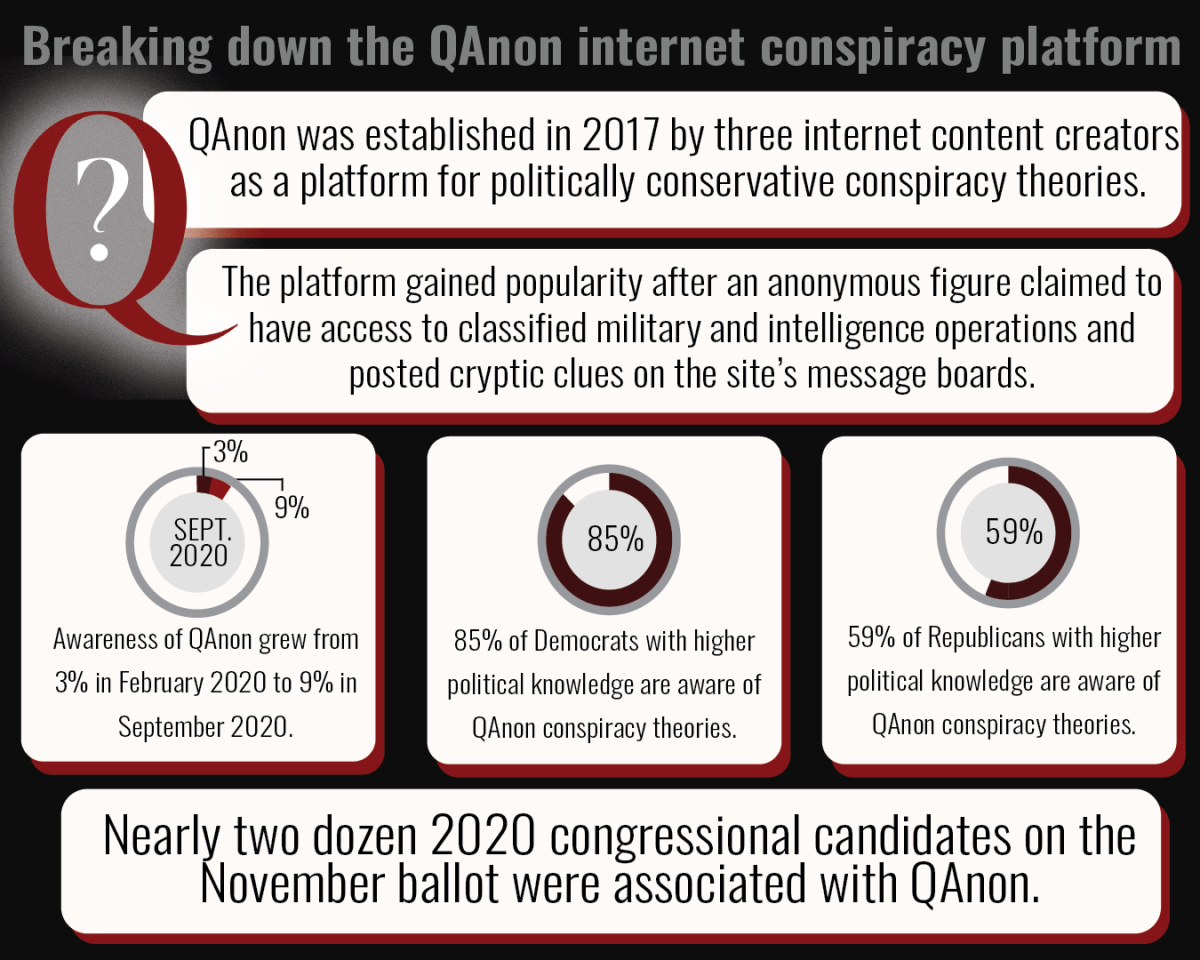
“Satanic rituals, a deep state and child-eating Democrats”– no, that’s not the plotline to a new Ari Aster film à la “Midsommar.”
These are some of many QAnon beliefs that threaten our democracy with their growing presence.
QAnon was established in the dark fringes of the internet as a conspiracy group in 2017 by a small YouTube content creator and two moderators of 4chan, according to an Aug. 14, 2018 NBC News article.
4chan is one of the most extreme anonymous internet message boards, according to the same article.
An anonymous figure who goes by the alias “Q” claims to have access to classified military and intelligence operations, while posting cryptic clues on the site’s message boards for their followers to decipher, according to the NBC article.
But people who flock to cryptic message boards on the dark web have created extremism.
After the 2016 presidential election, a 28-year-old warehouse worker from North Carolina named Edgar Maddison Welch drove to Comet Ping Pong, a pizzeria in Washington D.C.
Welch walked in with an AR-15 in his hands and a Colt revolver on his hip, according to a Feb. 16 Washington Post article. Welch scattered employees and customers and fired his assault rifle into a door, according to the Department of Justice.
He theorized that powerful Democrats were abusing children in the pizzeria and thus the “Pizzagate” conspiracy gained attention.
The events of Pizzagate show how false internet claims can quickly result in domestic terrorism.
“Q” made their first appearance on the dark web in October 2017. Their posts supported Pizzagate and elaborated on the conspiracy.
“Q” said satanic Democratic pedophiles controlled both the small D.C. pizzeria and the entire world, according to the same Washington Post article.
These theories involving children resulted in trending hashtags such as #Pedogate and #SaveTheChildren on social media.
Save the Children is a legitimate nonprofit that combats child trafficking and used the hashtag to spread awareness.
But QAnon warped its meaning into a gross conspiracy theory hashtag.
I have seen so many clueless adults share #SaveOurChildren on Facebook, further feeding the QAnon misinformation rabbit hole.
The pandemic has progressed QAnons agenda with strategic social media algorithms and by capitalizing off of people’s increased screen time.
Too much screen time during a pandemic can rapidly turn anyone into a “conspiracy expert.”
A Nov. 16, 2020 Pew Research Center study found that awareness of QAnon grew from 3% in February to 9% in September.
People with more political knowledge are also more likely to know about QAnon conspiracies, according to the research.
Among Democrats, 85% of those with higher political awareness have heard of the conspiracies, compared to 59% of Republicans.
Nearly two dozen 2020 congressional candidates on the November ballot were associated with QAnon, according to an October 2020 CNN article.
Politicians associated with the platform’s misinformation are instigating real violence all while gaining political power.
“Q” proposes former president Donald Trump is the solution to a world corrupted by Democrats, according to the Feb. 16 Washington Post article.
Marjorie Taylor Greene, U.S. Rep. for Georgia’s 14th congressional district, is an avid QAnon endorser.
She refers to Democrats as a “cabal,” defined as a secret plotting clique by Merriam-Webster.
“There’s a once-in-a-lifetime opportunity to take this global cabal of Satan-worshipping pedophiles out and I think we have [Trump] to do it,” Greene said in a deleted November 2017 Facebook livestream video.
QAnon’s extremism poses a threat to Americans, yet the group’s ideologies are publicly endorsed by politicians who hold power.
Greene was one of many Republican lawmakers to falsely claim Trump won the 2020 presidential election.
Trending tweets among theorists including #FightForTrump led to the January 6 U.S. Capitol riot.
People were seen holding signs that said, “We are Q” and the QAnon motto, “Where we go one, we go all,” according to a Jan. 7 Insider article.
According to an Oct. 15, 2020 article in The Guardian, QAnon has been linked to several crimes since 2018.
This includes threatening politicians, breaking into the Canadian prime minister’s residence, an armed standoff near Hoover Dam, two kidnappings and at least one murder.
Endorsing misinformation generates larger effects and enables followers to act upon dangerous ideologies.
Extreme conspiracy theory groups including QAnon should be treated as national security threats because they could dismantle the country’s fragile trust in the government.